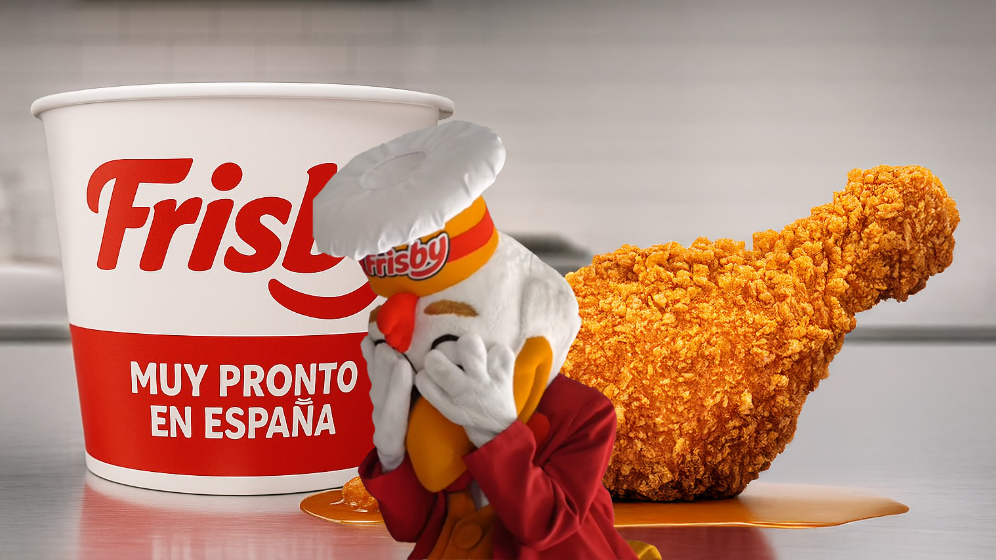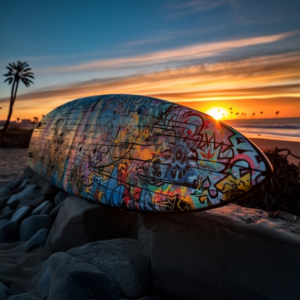
When the chicken flies faster than the legal strategy.
In the marketing world, a brand’s reputation isn’t built solely on creative campaigns and quality products; it also hinges on solid legal protection. The recent case involving Frisby, the iconic Colombian fried chicken chain, facing a legal dispute in Spain over the use of its brand, reminds us that neglecting intellectual property can turn a success story into a bitter lesson.
Frisby Colombia, with over 45 years of history, registered its trademark in Europe in 2005. However, the lack of effective use in that territory allowed a Spanish company, Frisby España S.L., to register the same name and similar visual elements, causing consumer confusion and triggering a legal battle.
This case not only highlights the importance of maintaining an active brand presence in international markets where it’s registered but also underscores the need for a comprehensive strategy encompassing both marketing and legal protection. Because, at the end of the day, a brand without legal defense is like a chicken without wings: vulnerable and exposed.
Intellectual Property Lessons for Expanding Brands
The Frisby Colombia case reminds us that registering a trademark in a territory isn’t enough; it’s essential to demonstrate its effective use to maintain rights over it. According to the European Union Trademark Regulation (EUTMR), a registered trademark can be revoked if effective commercial use isn’t demonstrated over a consecutive five-year period.
Frisby Colombia registered its trademark in the European Union in 2005, but the lack of significant commercial activity in Europe was a determining factor in the initial ruling favoring Frisby España S.L. The European Union Intellectual Property Office (EUIPO) revoked the trademark rights due to the lack of effective commercial use of the name in European territory.
This case underscores the importance of a comprehensive strategy that includes both marketing and legal protection. Marketing managers must be vigilant in managing intellectual property, especially when expanding into new markets.
However, the responsibility doesn’t rest solely on marketing teams. Brands, as entities, must ensure that their marketing and legal departments have the necessary resources, knowledge, and advisory support to protect and strengthen their presence in international markets. This includes investing in continuous training, hiring intellectual property experts, and implementing proactive strategies to maintain the validity and effective use of their trademark registrations.
In a globalized and highly competitive environment, protecting intellectual property isn’t a luxury but a strategic necessity. Brands that recognize and act accordingly will be better positioned to face challenges and seize opportunities in the global market.
Historical Intellectual Property Cases
The Frisby case isn’t an isolated incident in the world of marketing and intellectual property. Throughout history, various brands have faced similar challenges, offering valuable lessons on the importance of adequately protecting and managing intangible assets.
- McDonald’s vs. Supermac’s: Big Mac Loses Exclusivity in the EU
In 2019, the Irish chain Supermac’s succeeded in having the European Union Intellectual Property Office (EUIPO) revoke McDonald’s registered “Big Mac” trademark in the EU. The argument was the lack of effective use of the trademark in certain territories, allowing Supermac’s to expand without facing legal obstacles from the American giant.
- Bacardi vs. Pernod Ricard: The Battle for Havana Club
The dispute over the “Havana Club” trademark has pitted Bacardi against Pernod Ricard for over two decades. Bacardi markets the rum in the U.S., claiming rights acquired from the original founders, while Pernod Ricard does so in other countries with authorization from the Cuban government. This conflict highlights how historical and political factors can complicate brand management on an international level.
- Apple vs. Samsung: Design and Functionality in Dispute
Since 2011, Apple and Samsung have been involved in a series of lawsuits over alleged patent infringements related to smartphone design and functionalities. Although Apple obtained favorable rulings in some cases, the prolonged legal battle evidenced the complexity of protecting intellectual property in the tech industry.
- Adidas vs. Forever 21: The Three Stripes at Stake
Adidas sued Forever 21 for the unauthorized use of its distinctive three-stripe design on clothing. Although the case was settled out of court, it underscores the importance of protecting visual elements that are part of a brand’s identity.
- Atari vs. Nestlé: The Logo on a Chocolate Bar
In 2018, Atari sued Nestlé for using its logo without authorization in an advertising campaign for a chocolate bar. The case highlighted how even seemingly innocuous references can infringe intellectual property rights if proper licenses aren’t obtained.
Conclusion: Don’t Be the Next “Frisby” in Marketing
If there’s one thing the Frisby case and all these brand conflicts teach us—conflicts that might seem straight out of a drama series but are daily realities for marketing managers—it’s that intellectual property isn’t child’s play or a mere formality to beautify a portfolio.
It’s not enough to register the trademark and cross your fingers, hoping no one else touches it. Nor is the excuse of “we didn’t have the budget” valid for keeping the legal team updated or hiring experts on the subject. In a world where even a chocolate bar can spark a legal war with Atari, falling behind equates to losing.
So, to brands and their managers: ensure that resources, knowledge, and strategy are as fine-tuned as the latest Instagram algorithm. Because in this game, those who don’t run, fly… and those who don’t protect their brand end up with an empty shell.
In summary, before launching into new markets with your shiny software or “innovative” campaign, make sure your brand isn’t a house of cards. Marketing can be an art, but without the proper legal foundation, it’s just a very expensive mirage.
And before I’m sued for intellectual theft, here are my sources: wouldn’t want the next lawsuit to be over sarcasm plagiarism.

Óscar Aviv Rodríguez
Demand Generation Especialist
Red Design Systems
Share
From the CEO’s strategic vision to real stories of brands that are marketing for real.

Subscribe to the newsletter and receive each edition with insights, tools and trends ready to apply.
document.getElementById( "ak_js_1" ).setAttribute( "value", ( new Date() ).getTime() );







